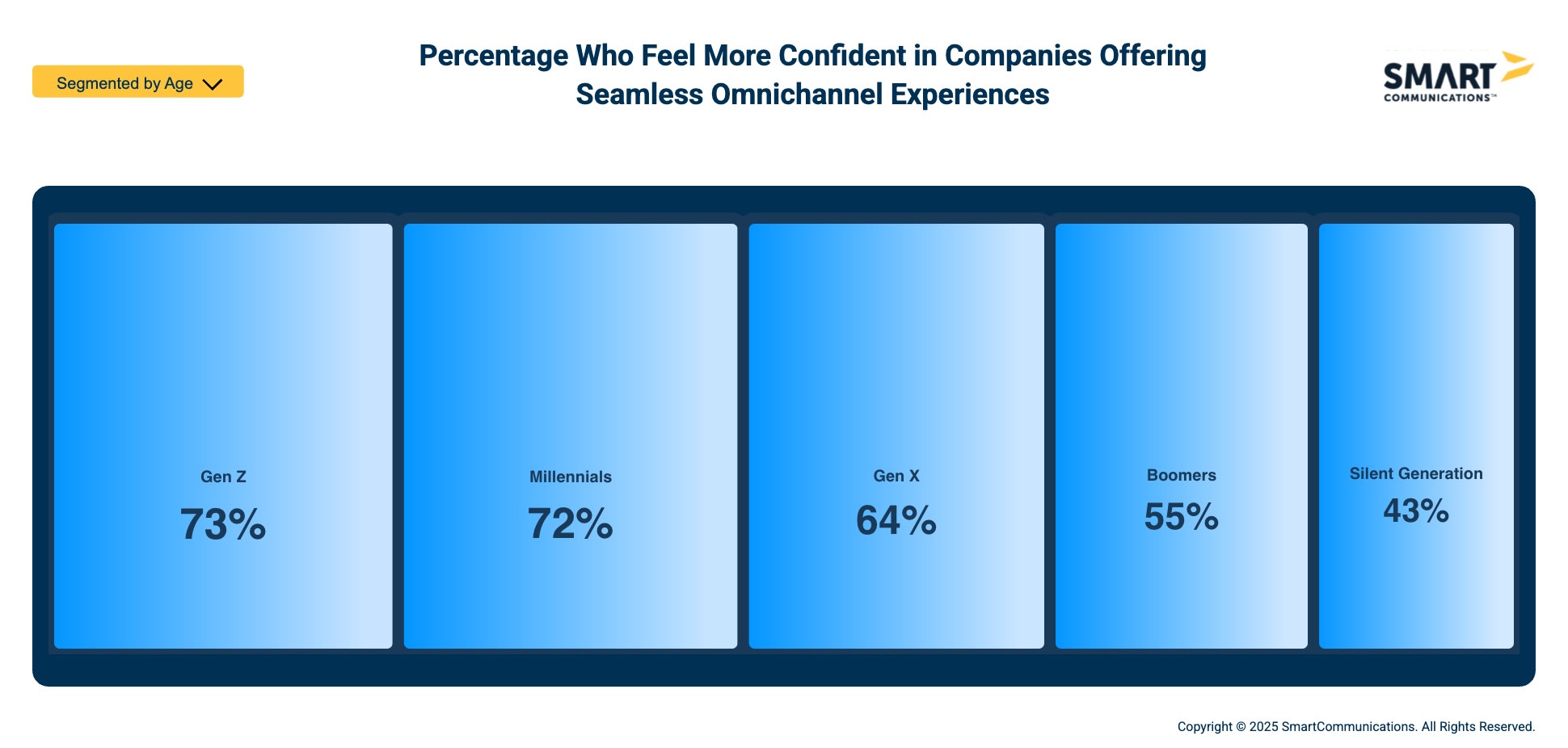Elevating Healthcare Provider CX: Key Insights from the 2025 Benchmark Report

By John Zimmerer, VP of Healthcare Marketing at Smart Communications
In addition to battling a host of existential crises, healthcare providers face mounting pressure to deliver seamless, personalized, and secure communication experiences. The 2025 Healthcare Benchmark Report from Smart Communications offers a comprehensive look into how patients perceive their interactions with healthcare organizations—and what providers must do to meet rising expectations.
This blog post distills the most critical findings from the report and explores how Smart Communications’ Conversation Cloud can empower providers to transform their customer experience (CX) strategies, improve operational efficiency, and build lasting patient trust.
The State of Healthcare Communications in 2025
The benchmark report, based on a global survey of 3,000 consumers, reveals a healthcare landscape in flux. While satisfaction with healthcare communications has improved—up 75% since the last benchmark—patients still report significant gaps in digital engagement, data transparency, and omnichannel consistency.
Key Findings for Providers:
1) Omnichannel Experience Gaps
- Only 54% of patients are satisfied with their omnichannel experiences.
- 71% prefer digital self-service over calling or visiting in person.
- Channel preferences vary widely by region and generation, with email, SMS, encrypted messaging, and web portals all playing critical roles.
2) Trust Hinges on Consistency
- 60% of patients trust healthcare organizations more when experiences are consistent across channels.
- This trust is especially high among Gen Z (73%) and in German-speaking countries (76%).

3) AI Adoption and Transparency
- 54% of patients are open to AI-driven health recommendations.
- However, 32% still express concerns about data security, and 31% worry about ethical AI use.
4) Communication Drives Loyalty
- 84% say communications are central to their overall experience.
- 67% would switch providers if communications don’t meet expectations.
These findings underscore a critical truth: communication is care. Providers who fail to modernize their engagement strategies risk losing patients—not just to competitors, but to frustration and disengagement.
The Provider Imperative: Modernize or Fall Behind
Healthcare providers are uniquely challenged by legacy systems, fragmented workflows, and regulatory complexity. Yet, patients increasingly expect the same frictionless experiences they receive from retail, banking, and tech brands.
To meet these expectations, providers must:
- Automate and streamline data intake and form processes.
- Deliver personalized, omnichannel communications that feel like one continuous conversation.
- Build trust through transparent data practices and ethical AI use.
- Ensure accessibility and compliance across all touchpoints.
This is where Smart Communications’ Conversation Cloud becomes a game-changer.
How the Conversation Cloud Solves the Provider CX Puzzle
The Conversation Cloud is a purpose-built platform designed to help healthcare organizations engage in smarter, more meaningful conversations with patients. It includes four integrated solutions:
- SmartIQ™ – Digital forms and guided experiences
- SmartCOMM™ – Personalized, omnichannel communications
- SmartPATH™ – Journey orchestration and automation
- SmartHUB™ – Centralized communication archive and retrieval
Let’s explore how each component addresses the report’s findings.
1. SmartIQ™: Closing the Digital Self-Service Gap
With 71% of patients preferring digital self-service, SmartIQ enables providers to replace outdated paper forms and manual intake processes with intelligent, mobile-friendly experiences.
Benefits for Providers:
- Accelerates preregistration, consent, and financial assistance workflows.
- Reduces staff burden and administrative errors.
- Improves accessibility with multilingual and ADA-compliant forms.
By digitizing data collection, providers can meet patients where they are—on their devices—and create a smoother, more welcoming entry point into care.
2. SmartCOMM™: Delivering Personalized, Omnichannel Communications
SmartCOMM empowers providers to create and deliver communications that are personalized, compliant, and consistent across channels—email, SMS, print, portals, and more.
Benefits for Providers:
- Ensures brand and message consistency across touchpoints.
- Supports HIPAA-compliant communications with encryption and audit trails.
- Enables personalized content based on patient preferences and data.
With SmartCOMM, providers can turn routine communications—appointment reminders, test results, billing notices—into moments of connection and trust.
3. SmartPATH™: Orchestrating the Patient Journey
SmartPATH helps providers design and automate communication journeys that guide patients through complex processes like referrals, chronic care management, and post-discharge follow-up.
Benefits for Providers:
- Reduces drop-off and no-show rates.
- Improves care coordination across departments and systems.
- Enables real-time adjustments based on patient behavior and feedback.
This orchestration ensures that every interaction feels intentional and supportive, reinforcing the provider’s commitment to patient-centered care.
4. SmartHUB™: Centralized Communication Management and Analytics
SmartHUB provides centralized oversight of all communications, enabling providers to track performance, identify pain points, and continuously improve.
Benefits for Providers:
- Offers analytics and dashboards to monitor satisfaction and engagement.
- Supports A/B testing and iterative improvements.
- Helps meet regulatory reporting requirements with built-in compliance tools.
With SmartHUB, providers can move from reactive to proactive CX management—aligning efforts with what truly matters to patients.
Building Trust in the Age of AI
The benchmark report highlights growing patient openness to AI—but also lingering concerns. Smart Communications addresses this by embedding transparency, security, and human oversight into every AI-powered interaction.
For example:
- SmartCOMM uses AI to generate plain-language summaries of complex medical documents (think: discharge summaries, care plans, etc.).
- SmartIQ can guide patients through forms using natural language prompts.
- SmartPATH ensures that AI-driven journeys are auditable and explainable.
By leading with clarity and integrity, providers can harness AI to enhance—not replace—the human touch in healthcare.
Real-World Impact: Provider Success Stories
Several leading healthcare organizations have already leveraged the Conversation Cloud to transform their CX:
- A large academic medical center reduced form completion time by 60% using SmartIQ.
- A regional health system improved patient satisfaction scores by 30% after implementing SmartCOMM for appointment reminders and follow-ups.
- A multi-specialty provider network used SmartPATH to automate post-discharge communications, reducing readmissions by 15%.
These outcomes demonstrate the tangible ROI of investing in smarter conversations.
The Future of Provider CX Starts Now
The 2025 Healthcare Benchmark Report makes one thing clear: patients are ready for better experiences. They want digital convenience, personalized communication, and ethical use of their data. Providers who rise to meet these expectations will not only retain patients—they’ll earn their trust and loyalty.
Smart Communications’ Conversation Cloud offers a proven path forward. By modernizing how providers engage, communicate, and orchestrate care journeys, it turns every interaction into an opportunity to deliver value, build relationships, and improve outcomes.



